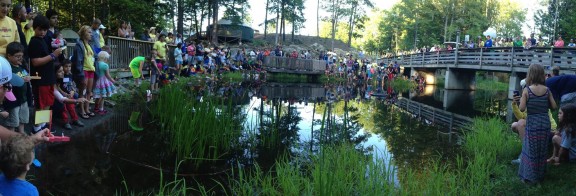A Clinician/Researcher’s Perspective… Camp Sunshine 2015

Dr. Steve Ellis & Dr. Vijay Sankaran
By Vijay G. Sankaran, M.D., Ph.D.
As both a pediatric hematologist caring for patients with blood disorders and a scientist working to improve our understanding of the genetic basis of these diseases, I spend a large fraction of my time thinking about Diamond Blackfan anemia (DBA). However, while I have always found DBA to be a fascinating disease to study in the laboratory and I have taken care of patients with DBA in the clinic, it is difficult to appreciate the enormous impact that DBA can have upon families. It is for this reason that I have found the DBA week at Camp Sunshine to be a continuous source of inspiration, motivating me back in the laboratory to increase our knowledge of DBA with the hope of positively impacting the lives of individuals with DBA and their families.
This year was my third time at camp. I was first invited while I was still a fellow, at which time I had just started to work on the genetics of DBA in the lab (and I am truly grateful to Dawn Baumgardner for inviting me without hesitation to my first camp to discuss our genetic studies). Beginning with this first time when I came to camp, I have had many eye opening experiences by being able to have the time to listen to the stories of families dealing with DBA. Having to think about coming in for regular transfusions, remembering to be faithful in using iron chelators, and having to deal with a variety of medications and the resulting side effects can pose enormous challenges. These daily issues, however, do not even begin to account for the uncertainty and trials that all patients with DBA and their families face.
Despite these daunting challenges, there is tremendous hope in coming to camp, not only for families, but also for researchers – such as myself – as we try to work on developing better treatments for DBA. The support that exists among the patients and families is truly humbling, and the interest in ongoing research is incredibly motivating. In fact, I vividly remember my first time at Camp Sunshine when I presented data from our genetic studies of families with DBA. I discussed how we had found mutations in a gene, GATA1, in some patients with DBA. As soon as I presented this work, many of the parents began to wonder how this finding impacted their own children, specifically, and our global understanding of DBA, in general. The questions they posed motivated us to work hard in the lab to further our understanding of the biology of DBA. In fact, shortly after leaving camp, we started to pursue some research that has allowed us to gain important insight into DBA.(http://www.nature.com/nm/journal/v20/n7/full/nm.3557.html).
This year at camp was no exception. While giving a brief talk on new areas of research that could have an impact upon DBA, I was asked a lot of questions about the role of emerging therapeutic approaches, such as gene therapy or genome editing.(http://www.nature.com/nm/journal/v21/n3/full/nm.3814.html). These questions have encouraged us to develop better ways to study DBA using patient samples. Indeed, a discussion I had at camp this summer inspired our lab to develop a test to look at GATA1 levels in specific blood cells in patient samples, which could have both diagnostic and therapeutic implications. This discovery would not have been possible without the incredibly insightful questions that I received from the numerous family members and patients interested in ongoing research.
These stories that I’ve touched upon are just a couple of the many motivating and enlightening moments I’ve had at camp as both a clinician and a researcher. Rather than continuing on and reiterating everything I discussed during my talk at camp this summer, I’d like to ask you a favor: Please stay in touch and keep the questions coming. As I’ve tried to highlight, Camp Sunshine is incredibly motivating; however, as you know it is held every two years, which means that we could go a long time without continuing these fantastic, incredibly helpful, and inspiring conversations. That would be a shame. Some of you are already in touch by email or through other methods, and I would encourage you to continue to do so. While at times things can get busy with the day-to-day routine, you have my promise that I will respond as soon as I can. Additionally, many of us try to communicate our latest research findings and we are thrilled when families and patients can be made aware of the work we do (and thanks to Dr. Steve Ellis, you continually get wonderful updates in his regular Journal Club column in the DBAF’s monthly e-newsletter). Not every promising lead will end up working in the clinical setting, but the more research we can do on DBA, the closer we can get to finding a therapy that may work for you or your loved ones. That is our hope. Please keep pushing us to get there.

A very special moment at Camp Sunshine – The Wishboat Ceremony
Vijay Sankaran, MD, PhD is a pediatric hematologist/oncologist at Boston Children’s Hospital and the Dana-Farber Cancer Institute. His laboratory website is http://bloodgenes.org and you can follow his lab on Twitter, @bloodgenes